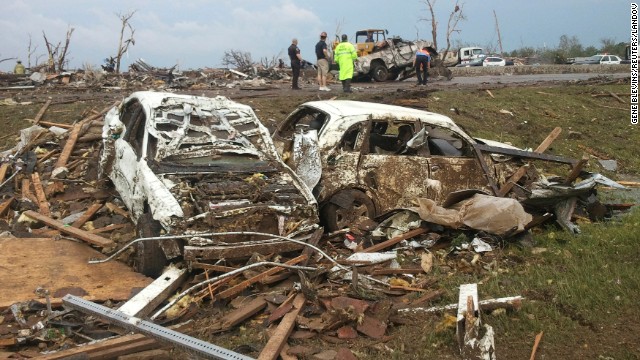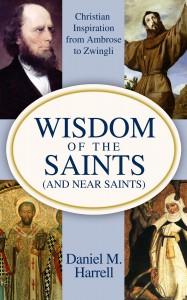In the aftermath of another horrific natural disaster, I include a few comments from my book Nature’s Witness reflecting on the theological implications, with no intent to address the deep pastoral concerns for the people in Moore (for that see Rachel Held Evan’s recent tet-a-tet with John Piper). In fact, if you’re suffering in Moore, read this next year.
Meteorologically speaking (this from meteorologist Paul Douglas in Minneapolis):
In spite a warming Earth there’s no conclusive, scientific evidence that we’re seeing more violent tornadoes. There’s more water vapor and instability to fuel severe storms, but in a warming world wind shear necessary for violent tornadoes should decrease over time. More research is needed, but I suspect the real culprit here is land use – suburban sprawl. The same monster tornado that hit farmland 20 years ago is now grinding into subdivisions and shopping malls.
Doppler radar can’t always estimate the intensity of a developing tornado, and as a nation we suffer from tornado fatigue: too many warnings. Out of 10 tornado warnings only 3 will produce a tornado, and the ones that form are usually small and brief. This breeds apathy and cynicism, so when the big one, the nightmare (“Tornado Emergency”) becomes reality – people are skeptical.
Theologically speaking:
When it comes to natural disaster, I prefer the doctrine of a fallen creation—that somehow our succumbing to sin fueled the chaos we experience as disease and disaster, especially given the biblical connections between human sin and creation’s decay (Gen 3:17; Rom 8:21–22). But diseases and disasters occurred long before Adam bit off more than he could chew, long before Homo sapiens showed up at all. Therefore it really doesn’t work to say that diseases and disasters are outcomes of a fallen creation. They’re the outcomes of a competent yet free creation, a creation that operates the way God made it.
Human freedom and creation’s freedom often clash. But the clash is usually due to human choice. You can’t blame God when you build your house too close to the shore or along a known geologic fault line or in tornado alley. You can pray that God might redirect the weather or stabilize tectonic plates, but to be realistic, living in God’s world is more about conforming to its limits than expecting God to conform to human demands. Still, I would like to think that God would do more to guard his people from harm. Earthquakes and tsunamis and tornados kill thousands. Is this an unavoidable outcome of freedom? The unavoidable consequence of human choices? Does God value freedom so much as to be constrained by it?
Frankly, there are too many places in the Bible where God defies creaturely freedom to suggest that his hands are ever tied. However in most of those places, God’s defiance of creaturely freedom is in response to human abuses of freedom, such as when disease, weather or earthquakes are employed as agents of divine judgment (e.g., Exod 9:3; 1 Kings 17:1; Isa 29:6). The same is true with regard to redemption. God defies creaturely freedom in response to human abuses of freedom by dying on the cross and rising from the dead. However there are other places where bad things just happen. God’s response there is to suggest that you see it as incentive to get your life in order (Luke 13:1–5).
If God is a competent creator, we have to view natural phenomena as exhibitions of his competence—and as far as earthquakes and hurricanes go, exhibitions of his majesty (Isa 29:6 and elsewhere). God’s involvement is miraculous at times, though miracles remain the exception rather than the rule. If miracles were normal, we couldn’t call them miraculous. Miracles show up at special intersections in biblical history as exclamation points to stress the purposes and identity of God. God need not miraculously intervene to be involved in his creation. To love sometimes means to let things be. For God to so love the world may mean a refusal to flout his own craftsmanship or to violate the character of relationship. God curbs his omnipotence, if you will, for love’s sake.
This is the last post for a few weeks while I’m on vacation. If you’re a Cultivare reader, bask in the brilliance of Kyle Roberts in my absence and I will return in July. Grace and peace.












